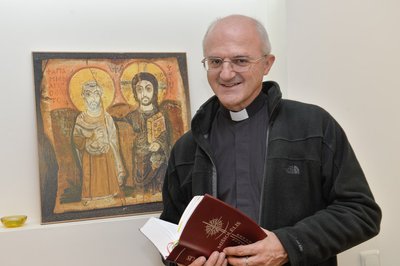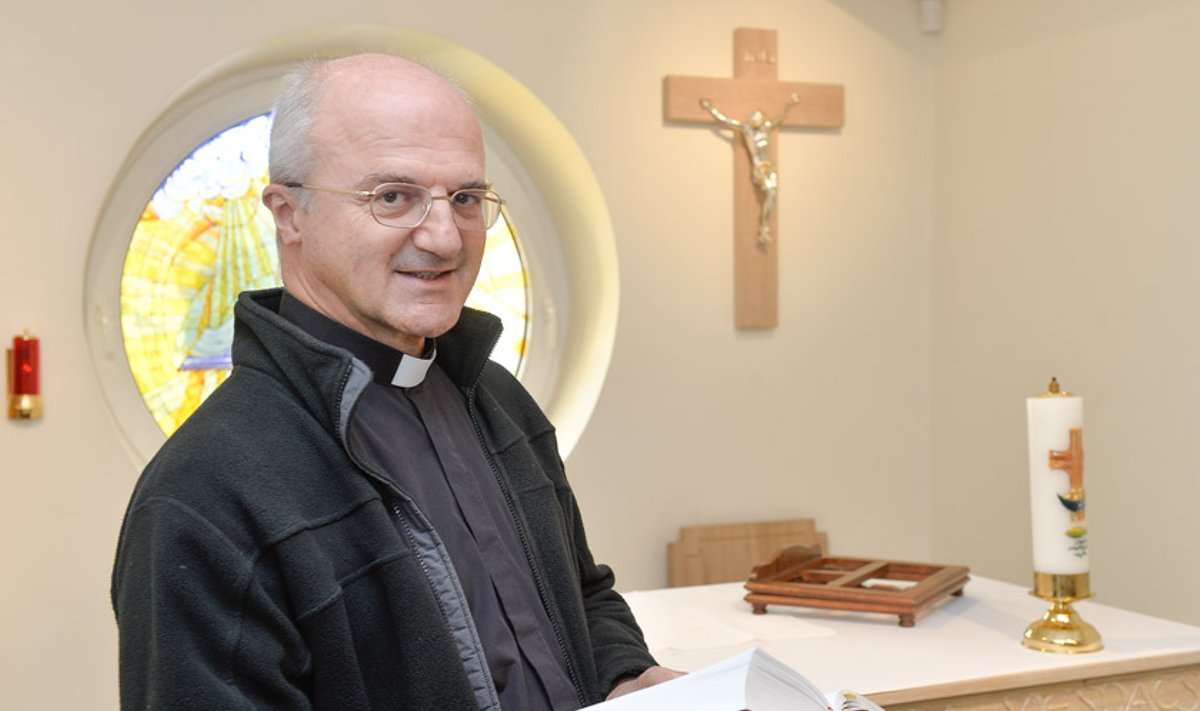The Mykolas Romeris University chaplain has walked a 200-kilometer stretch of Spain’s famous Camino Path to Santiago de Compostella many times. He comes from a large family with 15 siblings and therefore says that there’s nothing that’s difficult for him. Having lived in Lithuania for the last 15 years, he’s also fluent in Lithuanian.
- It has become popular to walk the Camino Path to Santiago de Compostella. You also like to walk this Path in Spain?
- Yes. I have walked it 8 times –usually with students or other people. There are people who have been to Palanga 4 times, but for me it’s better to walk the Camino or to climb mountains – the Pyrennes or Slovakia’s Tatras. Usually people walk about 25 kilometers per day. I would recommend walking 30-35 kilometers per day. We’ve walked up to 40 kilometers a day, but then the soles of your feet are “burning” on the last of a 5-day journey. We walk from Leon to Santiago de Compostella, which is about 200 kilometers in 5 days. I wouldn’t recommend walking the entire 700-kilometer stretch of the Camino because there are lots of flat parts. It’s just good marketing to get people to walk all those 700-kilometers. While walking the Camino, it’s possible to rest every 10 kilometers and meditate and think, which is good.
- Lithuanians in general like to travel and visit new countries, new places. Do you notice this as well?
- Yes, Lithuanians are travel-minded. During the Soviet period, people traveled to have a good time. Now people are searching for culture, a community, and to find something out. They want to learn about other cultures, their traditions and way of life.
Today’s Lithuanian travelers also don’t necessarily want to go to a hotel, but want to stay with the natives in their home or apartment. It takes trust to give a stranger keys to your home, so it’s a “journey of trust” also when you go abroad to stay with people you have just met.
You know, when I started to work in a school here in Lithuania, the pupils would say, that’s the guy who leaves the door open and never locks it. In Spain I also leave the door open at times.
- You are a very active priest who enjoys a variety of sports. So, it’s possible to say – a healthy body contains a healthy soul?
- Well, I grew up in Spain. My whole family would take part in sports. I was 5, when I first tried skiing and that stuck with me. I think sports is a way to be with other people, just like enjoying a meal with others or discussing something.
- So sports, being athletic, is important even for a priest?
- Yes and I always encourage students to participate more in team sports rather than individual sports – like lifting weights. In today’s world, it’s not the leader, but the team – together, that comes out ahead. If you don’t know how to work in a team, you’ll be a loser.

- You also volunteer in a number of organizations. How important is volunteering to you?
For one thing, it’s a way to leave your comfort zone, get out. Second, it is a way to leave behind your insecurities and addictions… I’m so beautiful/not beautiful, I don’t have much money etc. Then, when you volunteer, you meet people who are having a hard time, don’t have much, bet they live happily. It’s also a way to understand that you are endowed with talent. You see that you are needed somewhere. Then you understand, that you’re ok and you have gotten more than others.
- Father where do you volunteer and how often?
- We go to the “Santaros” hospital center in Vilnius and spend time with children there. We hand out chocolates. We draw with them and dance. We meet with them about once a month.
Also, we go to the “Caritas” children’s home, where we spend time with children from the foster home. Other times we volunteer at the “Betanija” Cafeteria for the unfortunate. There we hand out food once a week.
- You are often encouraging others to get involved, to volunteer and to show a community spirit.
- Well, I tell people that if they have time to go to “Akropolis” shopping center once a week, then they can find time to go –for an hour to volunteer at the hospital, food bank or at a children’s home.
- How long do you plan to stay in Lithuania?
- I will stay here until I die. Here every day is useful and meaningful. It is not difficult for me to live in Lithuania.
